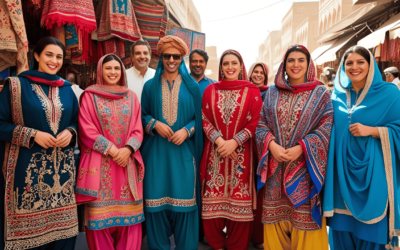History of Balochi Attire The Baloch people have a rich history that dates back centuries, and their clothing has evolved while maintaining its traditional essence. The attire has been influenced by the region’s balochidress forwomen, desert climate, and historical...
Culture
FAQs
What is the traditional attire in Pakistan?
The shalwar kameez is the traditional dress worn by both men and women, symbolizing Pakistan’s cultural identity.
What are some important festivals in Pakistan?
Eid-ul-Fitr, Eid-ul-Adha, and Basant are some of the most widely celebrated festivals in Pakistan.
What type of food is common in Pakistan?
Pakistani cuisine is known for its rich flavors and spices. Dishes like biryani, nihari, kebabs, and saag are popular.
Is music important in Pakistani culture?
Yes, music is an integral part of Pakistani culture, from classical forms like qawwali to folk and modern pop music.
What are some traditional crafts of Pakistan?
Pakistan is known for its hand-woven carpets, pottery, embroidery, and truck art, each region offering unique craftsmanship.
How do Pakistanis treat their guests?
Hospitality is a core value in Pakistan. Guests are treated with great respect and are often offered food or tea as a symbol of warmth and kindness.
Culture of Pakistan
Pakistan is a land of rich cultural diversity, where traditions, languages, and customs blend together in a unique and vibrant tapestry. From the bustling streets of Lahore to the serene valleys of Swat, the culture of Pakistan is shaped by its history, diverse ethnic groups, and deep-rooted traditions. Here’s a glimpse into the cultural heritage that defines Pakistan:
- Traditional Clothing: The most common attire in Pakistan is the shalwar kameez, worn by both men and women. It’s a symbol of the country’s cultural identity and is worn in different styles across various regions.
- Festivals and Celebrations: Pakistan’s festivals, like Eid-ul-Fitr, Eid-ul-Adha, and Basant, are celebrated with joy and enthusiasm. These events offer a glimpse into the country’s deep-rooted religious and cultural practices.
- Cuisine: Pakistani cuisine is an essential part of its culture. Rich in spices, flavors, and diversity, dishes like biryani, nihari, chapli kebab, and saag represent regional culinary traditions.
- Music and Dance: Music plays an integral role in Pakistani culture, from classical forms like qawwali and ghazals to folk music and contemporary pop. Traditional dances like bhangra and attān are celebrated at festivals and weddings.
- Art and Craft: Pakistan has a rich history of arts and crafts, with intricate hand-woven carpets, pottery, embroidery, and woodwork. Each region offers its own artistic touch, like the colorful truck art of Punjab or the delicate Peshawar carpets.
- Hospitality: Hospitality is a cornerstone of Pakistani culture. Guests are treated with utmost respect, and it’s customary to offer tea, sweets, or food as a symbol of goodwill and kindness.
Exploring Pakistan’s culture is an unforgettable experience, offering a deeper understanding of its people, traditions, and way of life.

